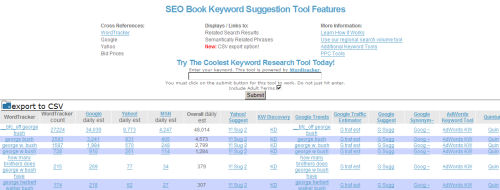Many webmasters have learned that keyword selection is important. In fact, it’s a critical part of the site design and building process. However, there are many considerations that go into picking a good keyword set. It’s not as simple as picking the highest volume keywords and building a page for each one. Here are some key things to consider:
- What are the highest volume keywords that relate to your site?
- What are the keywords that will be the best converting for your site?
- Can you build compelling content related to your keywords?
- Is your content sufficiently unique?
- Can you get other site owners who have sites related to your site (and selected keywords) to link to you using your keywords?
- Have you addressed the long tail?
- If you do everything right with keyword selection, content development, and getting links to your site, can you get to the first page of the search results?
The remainder of this article will discuss these 7 main points in detail.
- Of course, you want to rank for high volume keywords. This goes without saying. However, it is critical that you pick high volume keywords that relate to your site. The content of the site must closely match the keywords you select. Otherwise, you are heading down the slippery slope of being a Spammer.
You can greatly aid your research by using one of many available keyword tools. Aaron Wall offers an excellent keyword tool that looks like this:
 |
Aaron’s tool does a good job, and it’s free. You get basic keyword volume counts from multiple sources in a single screen. This includes data from Wordtracker.
You can go a bit deeper by subscribing to a tool such as Wordtracker. For the keyword phrase “SEO” it’s output looks like this:
One oddity in Wordtracker is that that it also distinguishes between capitals (“SEO” is reported differently than “seo”). We know of no search engine that cares about this distinction. The basic screenshot we provided above is providing more or less the same output that you got from Aaron Wall’s tool.
For a more value-added experience, you can try the Keyword Universe tool in Wordtracker. This allows you to research related keywords in a more dynamic way. Here is a sample screen for the keyphrase “seo”:
Notice that unlike the prior screenshot, not all of the words shown have “seo” as a part of it. Basically, Wordtracker is finding other words that are commonly used on the same web pages as your seed term. We use Wordtracker all the time.
-
Think about what keywords indicate someone ready to act. Some keywords convert much better than others. When you start out you may only have your gut feeling about what will sell best. Better still, see if you can get data from others in your industry, or from marketing services that cover your industry.
-
Compelling content is key as well. From a visitor perspective, it is about closing the sale. But it’s also key from a search engine perspective. Good on-page content will help search engine rankings as well. Since you have selected keywords that relate directly to your site, your content will naturally use related keywords that help reinforce the rankings for your selected words.
-
You need to develop unique content. This means that you can’t duplicate other people’s pages, or even your own. For example, if you have built a page about “digital cameras”, you can’t also build one about “digital camera” (even though the search engines treat these as different terms, and rank the results differently.)
-
Search engines rely heavily on links to your site in ranking the site. This is no longer based on the simplistic Page Rank algorithm that launched Google to prominence. Search engines look at the content in the link to your site, the content of the page where the link is found, and the content of the site where the link is found. These factors help determine the “relevance” of the link. Lots of relevant links is the most powerful way to improve your rankings. When you are picking a set of keywords that you are going to build your site around, make sure you also understand how you are going to get relevant links. For more information on linking strategies, check out these articles:
-
The long tail refers to the great morass of oddball strings that users actually type into search engines. While the highest volume terms are simple 2 to 3-word phrases (such as “digital camera”), the majority of the overall volume goes into other phrases (such as “buy a digital camera”). People type what they think makes sense to them when they search. The deeper your content, the more of this type of search volume you will pick up.
-
Last, but not least, can you win? For example, if the keyword you have in mind is “Microsoft”, it will be very, very difficult to get to the first page in the search engines. In selecting your keywords, make sure you spend some time evaluating the competition for those keywords. You don’t want to spend all your time and energy on a lost cause.
